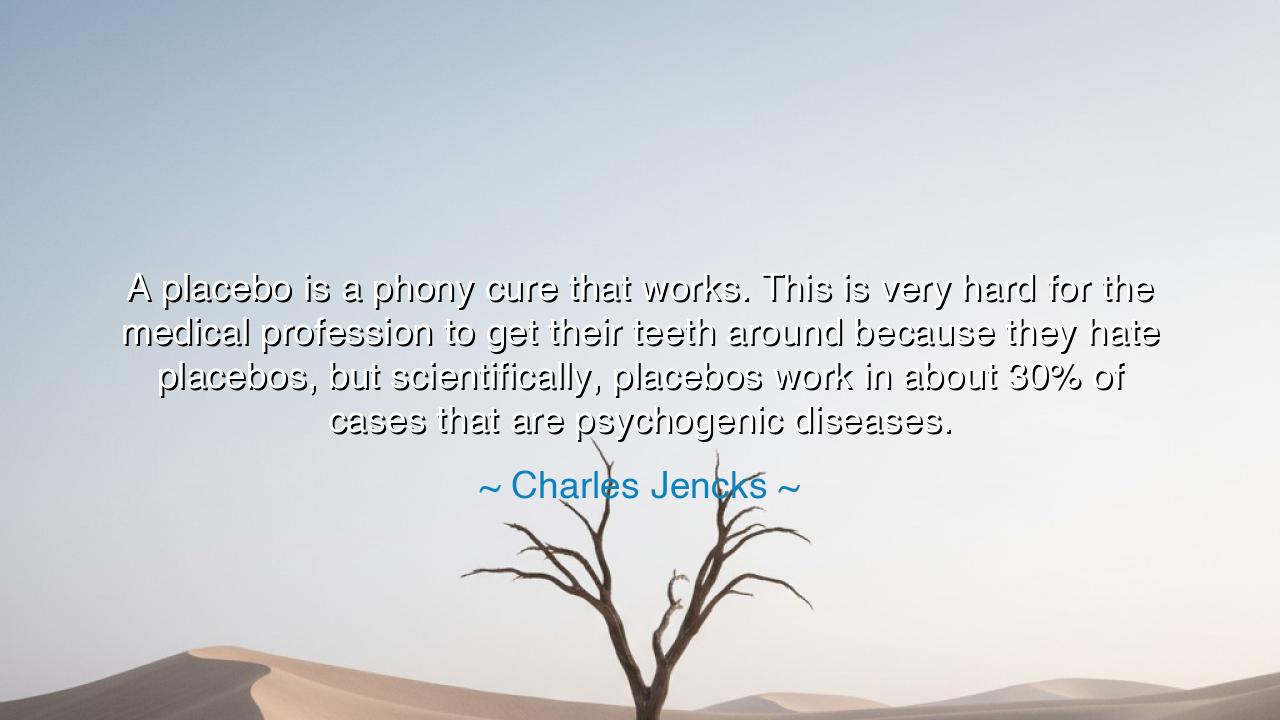
A placebo is a phony cure that works. This is very hard for the
A placebo is a phony cure that works. This is very hard for the medical profession to get their teeth around because they hate placebos, but scientifically, placebos work in about 30% of cases that are psychogenic diseases.






Hear the paradox spoken by Charles Jencks: “A placebo is a phony cure that works. This is very hard for the medical profession to get their teeth around because they hate placebos, but scientifically, placebos work in about 30% of cases that are psychogenic diseases.” In these words lies a mystery of the human spirit: that even a phony cure, empty of medicine, may summon real healing, because the mind itself, when awakened to hope, possesses powers deeper than steel or scalpel.
The ancients would not have been surprised by this truth. They knew that belief could quicken the body as much as herbs or potions. For what is the placebo, if not a vessel of faith disguised as medicine? When a suffering soul believes they are cared for, when their mind is convinced of healing, the body responds with vigor. The cells rally, the pain lessens, the breath steadies. Though the cure is phony, the healing is real. This is not trickery—it is the testament of the will and the spirit’s power over flesh.
Let us recall the story of Ambroise Paré, the great surgeon of the Renaissance. When he ran out of boiling oil, the accepted treatment for gunshot wounds, he dressed soldiers’ injuries with a simple balm of egg yolk, oil of roses, and turpentine. To his amazement, those treated with the humble ointment fared better than those who endured the cruel oil. Was it the balm alone, or the relief of soldiers believing they were spared torment, that aided their recovery? History whispers that part of their healing came from hope itself. Thus, the placebo effect has long walked alongside true medicine, an unseen ally.
Yet, as Jencks laments, the medical profession resists this truth. For doctors, trained in science and precision, recoil at the idea that the mind’s faith could rival their crafted remedies. They call placebos deceit, because they lack substance, forgetting that sometimes the belief in care is itself the strongest medicine. They see shame where there is wonder, and so they wrestle with the reality that healing is not always bound to chemistry, but to mystery.
The meaning of Jencks’ teaching is profound: that health is not merely a war of drugs against disease, but also a harmony between body, mind, and soul. The 30% who heal through placebo are witnesses to this eternal secret: we carry within us the seeds of our own healing, waiting to be stirred by trust, by love, by belief. It is not that medicine is false, but that the human spirit is far stronger than we often dare to imagine.
Therefore, take this lesson into your heart: never discount the power of hope, nor the effect of faith upon the body. Speak words of encouragement to the sick; offer them comfort, not only pills. Know that when you give someone reason to believe in their recovery, you may be giving them more than medicine—you may be awakening their own hidden physician within. Compassion, kindness, and belief are medicines too.
In your daily life, practice this truth. Do not scoff at hope, even if it comes in small, strange forms. Encourage others when they struggle, and yourself when you despair. If your body falters, seek the best of science, but also tend to the power of your spirit. Meditate, affirm, surround yourself with love, and believe in your strength to endure. For even when cures seem distant, the placebo of faith can carry you further than despair ever will.
Thus let us honor Charles Jencks’ words, not as a mockery of science, but as an exaltation of humanity’s hidden strength. A phony cure that works reveals a truth greater than medicine alone: that healing is not always found in bottles and needles, but in the vast, untapped power of belief. Guard this wisdom, and pass it on—for in every age, men and women will need reminding that their spirit is no less a healer than their doctor’s hand.






AAdministratorAdministrator
Welcome, honored guests. Please leave a comment, we will respond soon